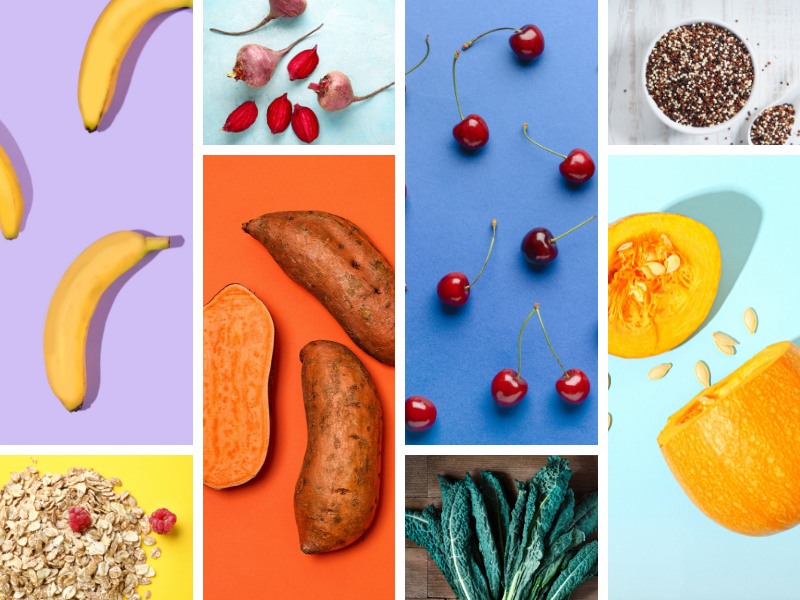By Kim Daly Farrell, CHC, and CEO of Mama Love
It doesn’t take much energy to power you through an afternoon of watching TV and napping on the couch. But when foot striking, striding, sweating, and panting are involved, suddenly your body needs more nutrients—and higher quality ones, too.
Immediately after running, your body’s glycogen synthetase levels soar. This enzyme converts glucose into glycogen and stores it in your muscles—making a snack within 30 minutes of your sweat session muy importante for recovery. So you chug a chocolate milk or chow down on a bar with the right combo of carbs and protein (look for a 3-to-1 ratio) to take advantage of that glycogen storage window. But, then what?
Your next real meal is where micronutrients need to shine. The pressure of taking in that perfect ratio of carbs to protein is off, and now you can turn your attention to a vast array of foods that bring more than just macros to the table. Here are 8 delicious ones that should be playing on repeat in every runner’s diet.
- Bananas Under the peel a banana, you’ll find potassium, magnesium, vitamin B6, and vitamin C—all nutrients needed to keep muscles, tendons, and connective tissue strong and healthy. Bananas can add bulk and sweetness to a breakfast smoothie, mingle with peanut butter and whole-grain toast for lunch, and don’t even get me started on nice cream for dessert!
- Beets get their gorgeous, dark pink color from betacyanin, an antioxidant that calms inflammation and eases post-workout muscle soreness. And research shows the naturally occurring nitrates in beets can boost your endurance when it’s time to log those long runs. Prepared just right, roasted beets are sweet and earthy at the same time—a flavor combo that can turn a boring side-salad into a mind-blowing main dish.
- Cherries Often lumped together with berries, this stone fruit can stand on its own when it comes to powerful antioxidants and other nutrients. Cherries contain soreness-busting anthocyanidins, and they’re a great source of natural melatonin—a hormone that helps regulate your circadian sleep-and-awake cycles. (Mattress time is extremely important for muscle recovery since the body repairs itself during sleep.)
- Kale has been celebrating its fifteen minutes of fame for, like, fifteen years now. It continues to steal the spotlight from other leafy greens because it’s practically a multi-vitamin. Ounce for ounce, kale has four times more vitamin A and vitamin K than spinach. (Vitamin A is an immune booster, and vitamin K is essential for healthy blood clotting and strong bones.) Plus, three times more lutein and zeaxanthin, two antioxidants found in the retina that work together to protect eye health. It’s also loaded with vitamin B6, calcium, potassium, copper, and manganese, and it has more iron than a serving of beef. (Wow, right?!)
- Oats Your grandpa probably eats them to stay regular, but oats have major benefits outside of the bathroom. This humble, whole grain contains special plant compounds called avenanthramides, which have been shown to curb exercise-induced inflammation in older runners and protect against joint damage in younger runners. That means Boomers, Gen Y, Millennials, and even Gen Z can all get something good from a bowl of oatmeal. Somebody, alert TikTok!
- Pumpkin is loaded with potassium to help restore electrolyte balance, fiber to power you through your next sweat session, and beta carotene, which gets converted in your body to vitamin A and used all over, for things like healthy eyes, strong immune cells, and radiant skin. Plus, inflammation-fighting fatty acids and unique alkaloids and flavonoids that may reduce your risk of diabetes and certain types of cancer. Before you complain about all the work involved—scooping, peeling, slicing, roasting—listen to this: Canned pumpkin can be more nutritious than fresh! Yup. Because a lot of the water gets pressed out, canned pumpkin offers ten (that’s 10!) times more beta carotene.
- Quinoa (Remember when no one knew how to pronounce that?) A seed in whole-grain clothing, quinoa is a great source of plant-based protein. Ounce for ounce, cooked quinoa offers up more magnesium, folate, iron, and fiber than cooked brown rice. All that fiber helps regulate digestion and bowel function and supports the cardiovascular system by keeping cholesterol levels in check. More fun facts: Quinoa is non-GMO, usually organically farmed, and astronauts have considered growing it in outer space!
- Sweet Potatoes are rich in minerals known to support sleep and relaxation, namely potassium, magnesium, and calcium. And despite tasting sweeter, they rank lower on the glycemic index than their pale, white cousins. That’s because the sugar found in sweet potatoes is locked up in a fiber-rich flesh that gets digested more slowly and keeps blood sugar levels even. All that fiber can boost your mental health and your ability to fight off infections, too—by supporting the good bacteria living in your gut that have been linked to a speedy immune response and overall well-being. Better sleep, better mood, better able to beat colds and flus—better go eat some sweet potatoes!
Kim Daly Farrell is a certified health coach, former magazine editor, 3x marathon finisher, and mom to two amazing kiddos. She has worked for national media outlets, including Good Housekeeping, Glamour, and Shape; and health industry leaders, including MyFitnessPal and Fitbit. Today, she calls the shots as founder and CEO of Mama Love LLC, a plant-based sports nutrition company.
More Articles by Kim:
Do Moms Need More Protein? Hell, Yeah!
5 Resistance Band Moves for Busy Moms
Chocolate Peanut Butter Smoothie Recipe
